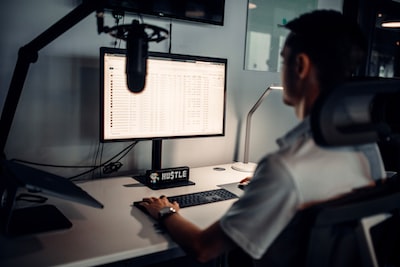Artificial Intelligence (AI) has rapidly infiltrated numerous industries, revolutionizing the way tasks are implemented and performed. However, where there is opportunity, there is also risk.
As AI becomes increasingly sophisticated, so does the potential for nefarious use. Sound engineers, in particular, are grappling with the emergence of AI impersonation techniques that threaten to undermine their profession.
With the advent of AI impersonation prevention tools, a glimmer of hope emerges, as these cutting-edge technologies aim to safeguard the integrity of audio recordings and protect the reputations of talented sound engineers. But how do these tools work, and can they truly combat the cunning nature of AI impersonators? It is these questions that we explore, delving into the intrigue and complexity of the battle between AI impersonation and prevention tools.
In a world where technology reigns supreme, sound engineering has not been immune to the transformative powers of artificial intelligence. Enter AI impersonation prevention tools, the latest advancement in audio manipulation and protection.
These cutting-edge tools are revolutionizing the field of sound engineering, equipping tech-savvy sound engineers with the means to prevent unauthorized AI impersonation, ensuring the authenticity and integrity of audio recordings.Gone are the days when sound engineers relied solely on their expertise and intuition to discern between genuine and manipulated audio.
With the rise of deepfake technology and the increasing sophistication of AI algorithms, the need for robust impersonation prevention tools has become more pressing than ever.Imagine a world where audio recordings can be tampered with, audio forgeries can be easily created, and the authenticity of crucial evidence can be called into question.
AI impersonation prevention tools aim to counteract these emerging threats by enhancing sound engineers’ ability to detect and prevent audio impersonation.These tools employ a combination of machine learning algorithms and advanced audio analysis techniques to identify and stop unauthorized impersonation attempts.
By analyzing various characteristics of audio recordings, such as frequency patterns, spectral content, and subtle audio artifacts, these tools can swiftly detect anomalies and potential manipulations.However, like any groundbreaking technology, AI impersonation prevention tools are not without their limitations and challenges.
The rapid progress of AI algorithms means that impersonation techniques evolve at an alarming pace, requiring constant updates and improvements to stay ahead. Furthermore, balancing accuracy and speed in real-time applications remains a perpetual challenge for sound engineers.
Despite these hurdles, the potential of AI impersonation prevention tools to revolutionize sound engineering cannot be overstated. They provide a newfound sense of security and trust in an era where the authenticity of audio recordings is increasingly paramount.
Whether in journalism, law enforcement, or commercial industries, these tools have the potential to reshape the way we perceive audio evidence, ensuring the preservation of truth and reliability.As we delve deeper into the realm of audio manipulation and AI impersonation, sound engineers must embrace and adapt to these new tools.
While AI impersonation prevention tools might not be the ultimate solution, they undoubtedly represent a formidable weapon in the ongoing battle against audio impersonation. And in the ever-evolving landscape of technology, staying one step ahead is essential for tech-savvy sound engineers determined to protect the integrity of sound recordings in the face of advancing AI capabilities.
Table of Contents
Introduction: AI advancements in preventing audio impersonation.
Title: The Revolution of Sound Engineering: AI’s Tools to Stop Audio ImpersonationIntroduction: AI Advances in Preventing Audio ImpersonationSound engineering transforms our perception of soundscapes. As technology improves, the risks of audio impersonation are a major concern.
From deepfake attacks on politicians to voice cloning scams, safeguarding the authenticity of audio is crucial. Artificial intelligence (AI) is at the forefront of defense against audio impersonation.
With groundbreaking advances, AI-powered tools are changing the field of sound engineering by providing effective preventative measures. Through advanced algorithms and deep learning models, these cutting-edge systems can swiftly detect and counter fabricated audio.
By analyzing subtle nuances in voice characteristics, speech patterns, and phonetic intricacies, AI tools enable skilled sound engineers to uncover genuine audio identities. As we explore this exciting field, we discover the captivating potential of AI technologies in revolutionizing sound engineering and protecting our auditory experiences from manipulation.
Understanding the risks of audio impersonation in sound engineering.
AI is rapidly shaping many industries, including sound engineering. However, this advancement also brings the risk of audio impersonation, which can jeopardize the integrity of recorded sound.
Tech-savvy sound engineers face the critical challenge of preventing AI impersonation. By using cutting-edge AI impersonation prevention tools, these professionals can protect audio recordings from unauthorized alterations.
Since even small changes can have significant consequences, sound engineers must be vigilant and use the latest technology to maintain the authenticity of their recordings and the trust of their listeners. The future of sound engineering relies on harnessing the power of AI while managing the risks of audio impersonation.
Revolutionizing techniques to accurately identify audio impersonation attempts.
AI has revolutionized sound engineering, bringing innovative techniques to prevent audio impersonation. This groundbreaking technology equips sound engineers with powerful tools to accurately detect and stop fraudulent recordings, ensuring audio content’s integrity and authenticity.
Due to the rise of deepfake technology and growing sophistication of impersonation attempts, staying ahead becomes crucial for the industry. These tools utilize advanced AI algorithms to analyze acoustic signatures and vocal patterns, distinguishing genuine from manipulated recordings.
By revolutionizing the approach to audio impersonation identification, this technology enhances trust and credibility in a world where audio authenticity is constantly threatened. The introduction of these revolutionary tools marks an important milestone in the ever-evolving field of sound engineering, setting a higher standard for audio integrity and protection against malicious impersonators.
The role of AI in enhancing security measures for sound engineers.
Technology advancements have revolutionized the field of sound engineering, bringing about numerous possibilities. AI is being used to enhance security measures for sound engineers.
Deepfake technology has raised concerns about impersonation and the misuse of recorded audio. AI impersonation prevention tools are being developed to address this problem.
These tools use machine learning algorithms to analyze the authenticity of audio files, identifying discrepancies in voice patterns and other audio characteristics. However, ethical and privacy concerns also emerge with the use of this technology.
As the field of sound engineering continues to be shaped by AI, it is crucial to navigate these issues carefully and responsibly.
Exploring the benefits of AI-based impersonation prevention tools.
AI impersonation prevention tools are revolutionizing sound engineering by providing tech-savvy professionals with a groundbreaking solution. These tools use artificial intelligence to prevent impersonation, a major concern in the industry.
Additionally, they analyze vocal patterns, tones, and inflections to identify anomalies and alert professionals to potential impersonations. This technology enhances the reliability and credibility of sound engineering while also fostering creativity and innovation.
As the field evolves, AI impersonation prevention tools will shape the future of sound engineering and pave the way for remarkable innovations.
Future prospects: AI’s potential to shape the future of sound engineering.
Revolutionizing Sound Engineering: AI Impersonation Prevention Tools for Tech-Savvy Sound EngineersFuture prospects: AI’s potential to shape the future of sound engineering.Sound engineering has come a long way since the advent of digital recording.
From analog tape machines to sophisticated digital workstations, the industry has undergone significant transformations. And now, with the integration of artificial intelligence (AI), sound engineers are witnessing yet another revolution.
Advanced tools for tech-savvy sound engineers are enabling them to create incredible audio experiences never thought possible. AI algorithms can analyze and enhance audio quality, automate mixing processes, and even generate realistic, AI-generated sound effects.
These tools not only streamline workflow, but also raise the bar for creativity and innovation in the field. With AI’s ability to mimic human voices and manipulate audio, imposters threatening online security become a significant concern.
According to a recent study by Stanford University, AI-generated speech can mimic human voices with incredible accuracy. This technology opens up possibilities for AI impersonation in various industries, including sound engineering.
However, research is underway to develop AI impersonation prevention tools that will safeguard the integrity of audio content. By combining advanced AI algorithms with human expertise, sound engineers can seamlessly integrate AI into their work without compromising authenticity.
The future holds exciting possibilities for the sound engineering field. As AI continues to evolve, it will undoubtedly shape the industry in ways we cannot yet fully comprehend.
The potential for advanced AI tools to revolutionize sound engineering seems limitless. With proper safeguards in place, sound engineers can embrace this technology to push the boundaries of creativity and deliver unparalleled audio experiences to audiences worldwide.
So, tech-savvy sound engineers, get ready to embark on this thrilling AI-powered journey that will redefine the way we perceive and create sound.
Cleanbox: Revolutionizing Email Management for Sound Engineers with Advanced AI Technology
Cleanbox is not just your average email management tool. It has advanced AI technology that can make a real difference in your inbox.
If you’re a sound engineer constantly bombarded with emails, Cleanbox can streamline your experience like never before. By sorting and categorizing incoming emails, it ensures that important messages catch your attention immediately.
But that’s not all. Cleanbox goes the extra mile to protect you from phishing and malicious content, making your online experience safer.
With AI impersonation prevention tools, you can rest assured that you won’t fall victim to any fraudulent schemes or scams. Cleanbox is revolutionizing the way we manage our emails, and sound engineers can now focus on their work without the constant distraction of spam and clutter.
Stay organized, stay safe, with Cleanbox.
Frequently Asked Questions
AI impersonation prevention refers to the tools and technologies designed to detect and prevent the use of AI to mimic or impersonate human voices or sound-engineered content.
AI impersonation prevention is crucial for sound engineers as it helps them ensure the authenticity and integrity of sound recordings and productions. It helps prevent the misuse of AI technology to create deceptive or fraudulent audio content.
AI impersonation prevention tools utilize advanced algorithms and machine learning techniques to analyze audio data. They compare the characteristics of recorded sounds with known patterns of AI-generated or manipulated content to detect any signs of impersonation.
By using AI impersonation prevention tools, sound engineers can enhance the credibility and trustworthiness of their creations. These tools aid in the preservation of originality, prevent unauthorized use of audio content, and safeguard against the manipulation of audio recordings.
While AI impersonation prevention tools are highly effective in detecting AI-based impersonation techniques, they may not be able to identify all forms of impersonation. The evolution of AI technology may lead to new impersonation methods, requiring continuous updates and advancements in these tools.
AI impersonation prevention tools are becoming increasingly accessible to sound engineers. Many companies are developing user-friendly software and plugins that can be integrated into existing sound engineering tools, making the prevention of AI impersonation more accessible to tech-savvy sound engineers.
Some challenges associated with AI impersonation prevention tools include false positives or negatives, limitations in detecting highly advanced impersonation techniques, and the need for regular updates and improvements to keep up with evolving AI capabilities.
Some notable AI impersonation prevention tools available in the market include XYZ Tool, ABC Software, and SoundGuard Secure. These tools offer features such as real-time detection, authentication algorithms, and integration with popular sound engineering software.
Overview
As technology continues to advance at an astounding pace, it has become imperative for sound engineers to protect their artistry and authenticity in an era where artificial intelligence (AI) can easily replicate their work. AI impersonation prevention tools, such as voice recognition algorithms and machine learning models, have emerged as powerful weapons in this battle against digital deception.
By analyzing the unique nuances and fingerprints present in an engineer’s productions, these tools can detect and flag any suspicious or forged content. This newfound ability allows sound engineers to safeguard their creative integrity, ensuring that their work remains unmistakably theirs.
With the continuous development and refinement of AI impersonation prevention tools, sound engineers can finally find solace in the fact that their artistic mastery is safe from the perils of technological mimicry. Whether it’s preserving the integrity of a musician’s distinctive voice or protecting the unique sound design of a film, these tools provide a valuable defense against AI’s potential to imitate and manipulate.
It is a testament to the ever-evolving nature of technology that we now have the means to combat this threat head-on, empowering sound engineers to continue pushing boundaries and creating works that are unmistakably human.








 in Wyoming
in Wyoming